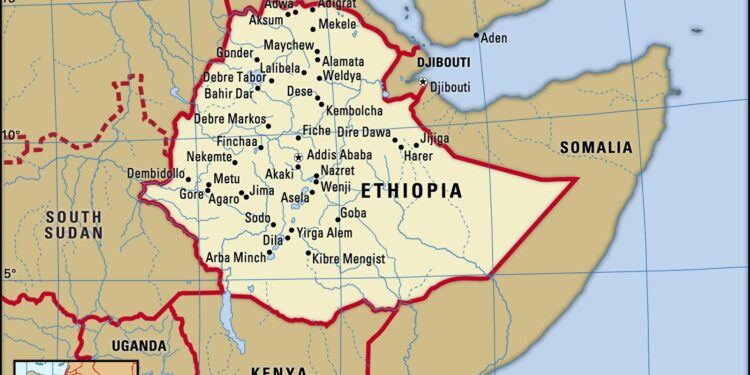Title: Ethiopia’s Challenging Journey Toward Embracing the Electric Vehicle Revolution
As the global momentum for eco-friendly transportation intensifies, Ethiopia is striving to carve out its place in the electric vehicle (EV) landscape. Despite growing worldwide enthusiasm for sustainable mobility, this East African nation confronts numerous hurdles that slow its EV adoption. From scarce charging infrastructure and economic limitations to an emerging automotive sector still finding its footing, Ethiopia’s transition to electric vehicles is marked by complexity and uncertainty. This article explores the multifaceted challenges facing Ethiopia’s EV ambitions, examining infrastructural deficits, policy gaps, market dynamics, and strategic pathways that could shape the country’s environmental and economic future. With stakeholders ranging from government bodies to private enterprises grappling with these issues, Ethiopia stands at a pivotal moment—poised either to accelerate innovation or face stagnation in its automotive evolution.
Overcoming Infrastructure Deficiencies and Policy Gaps in Ethiopia’s EV Landscape
Ethiopia finds itself at a critical juncture as it attempts to integrate electric vehicles into its transportation ecosystem amid significant structural challenges. One of the foremost obstacles is the limited availability of charging stations; currently concentrated mainly in Addis Ababa and a few other urban hubs, this sparse network fails to inspire confidence among potential EV users concerned about accessibility during longer journeys. The country’s diverse topography—with mountainous regions and uneven road conditions—further complicates efforts to expand reliable charging infrastructure into rural communities where demand may eventually grow.
Equally important are policy frameworks that remain underdeveloped or inconsistent regarding electric vehicle promotion. Unlike some nations offering robust incentives for clean energy transport adoption, Ethiopian authorities have yet to establish comprehensive measures such as:
- Financial Incentives: The absence of tax reductions or purchase subsidies limits consumer affordability for EVs.
- Regulatory Clarity: Lack of defined emission standards or manufacturing guidelines creates uncertainty within industry players.
- Public Education: Insufficient awareness campaigns mean many citizens remain unaware of both environmental benefits and long-term cost savings associated with EV ownership.
Addressing these infrastructural shortcomings alongside coherent policy development will be essential if Ethiopia aims to foster widespread acceptance of electric vehicles.
Balancing Local Production Initiatives with Import Regulations: Navigating Market Forces
The Ethiopian government faces complex decisions as it seeks not only to encourage domestic production but also manage import policies affecting the nascent EV market. International automakers increasingly view Africa as an emerging frontier; however, without clear strategies supporting local manufacturing—including access to raw materials and streamlined supply chains—efforts risk faltering.
Promoting local assembly plants offers promising advantages such as job creation opportunities and reducing reliance on costly imports that strain foreign exchange reserves. Yet import tariffs on essential components can inadvertently raise production costs if not carefully calibrated. Conversely, lowering tariffs might stimulate competition but could undermine fledgling domestic manufacturers lacking economies of scale.
Key policy considerations shaping this delicate balance include:
- Assembly Subsidies: Financial support aimed at companies assembling vehicles locally can catalyze industrial growth.
- International Partnerships: Collaborations with foreign firms facilitate technology transfer crucial for building technical expertise within Ethiopia.
- Infrastructure Investment: Expanding fast-charging networks alongside roads enhances consumer trust in adopting new technologies.
| Main Consideration | EFFECT ON LOCAL MANUFACTURING | EFFECT ON IMPORTS |
|---|---|---|
| TARIFF POLICY CHANGES | If reduced: Encourages growth by lowering input costs for manufacturers | If lowered: Increases competition from imported vehicles/components |
Strategic Pathways To Accelerate Electric Mobility Adoption Across Ethiopia
Transitioning toward an electrified transport system demands coordinated action across multiple fronts—from infrastructure expansion through regulatory reform—to community engagement initiatives designed around inclusivity.
A primary focus must be placed on developing a comprehensive network of fast-charging stations accessible beyond metropolitan areas into peri-urban zones where demand is expected soonest. Public-private partnerships could incentivize investment by sharing risks while ensuring geographic coverage sufficient enough so range anxiety no longer deters consumers from switching away from fossil fuel-powered cars.
Simultaneously introducing targeted fiscal incentives such as tax exemptions or rebates will lower upfront costs both for manufacturers establishing operations domestically and consumers purchasing their first electric vehicle models—a strategy proven effective globally in markets like Norway where over 80% new car sales are now electrified (2023 data).
Raising public awareness through sustained educational campaigns highlighting not only environmental advantages but also lifetime savings related to fuel efficiency maintenance can shift perceptions positively toward embracing cleaner alternatives. Integrating sustainability topics into school curricula further nurtures future generations’ understanding while fostering innovation mindsets aligned with green technologies.
Moreover, forging alliances with international organizations specializing in clean energy transitions can unlock access funding streams along with cutting-edge technological know-how vital during early-stage industry development phases.
Engaging all relevant stakeholders via workshops ensures concerns are addressed transparently while creating shared ownership over progress made—a critical factor when navigating socio-economic complexities inherent within developing countries like Ethiopia.
Conclusion: Navigating Challenges Toward A Sustainable Transportation Future In Ethiopia
Ethiopia’s ambition towards embracing electric mobility reflects broader global trends prioritizing climate resilience alongside economic modernization; however,the path forward remains laden with obstacles ranging from insufficient infrastructure investments,to fragmented policies,and limited public understanding.The nation must marshal substantial resources coupled with innovative governance approaches if it hopesto transform these challengesinto opportunitiesfor sustainable growth.Investmentincharging networks,tax incentives,and educationcampaignswillbe instrumentalinbuildingconsumerconfidenceandindustrycapacity alike.As governmental agencies collaboratewithprivate sector partnersandinternational allies,the successofEthiopiasEV revolutionwilldependonitsabilitytoadaptflexiblywhilemaintaininglong-term vision.Despite current difficulties,the potential rewards—in termsofreduced emissions,economic diversification,and improved qualityof life—makethis journeyworth pursuingwithdeterminationandcooperationtowardsagreenerfutureforall Ethiopians.














